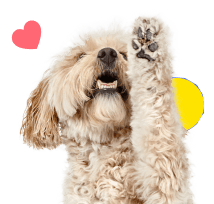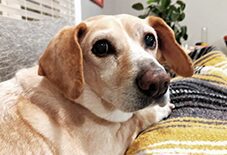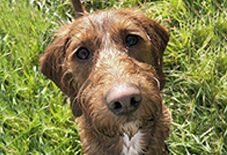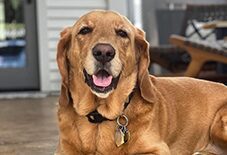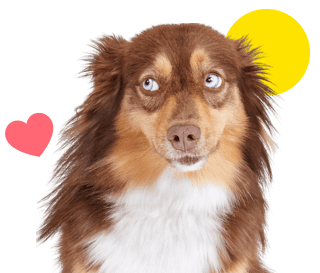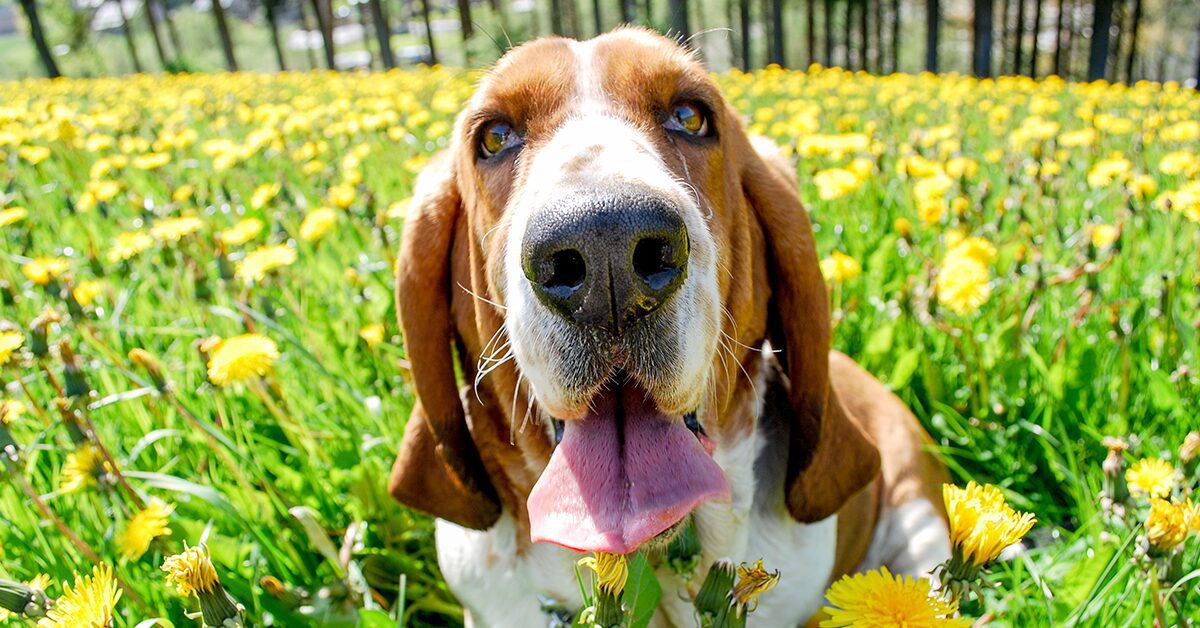
Meet the Basset Hound
Calm Canine
Apartment Friendly
Loyal Lapdog
Are you looking for a super cute, chill dog? Then I’m the prrrfect pup fur you! Don’t let my droopy face fool you – I’m the happiest pup around! I’m go-with-the-flow and up for anything, from long daily walks to interactive playtime to simply relaxing with you on the couch. My calm demeanor makes me a good apartment dog, too, and my easy going attitude makes me pawfect for all ages, including kiddos! I’m also a great watchdog when duty calls. Oh, and I’m a pack dog, so I love other four-legged cuties like me – don’t hesitate to add more pets to the mix.
Beyond that, I’m known for my little body and floppy ears, both of which you should learn more about. I’m prone to ear infections, so maintaining those puppies is essential. Obesity runs in my blood, so I’ll pack on the pounds without a proper diet. Pawlease keep me fit with daily exercise and good dog food! I also have a tendency to drool when treats are around. Behind my goofy exterior, there’s a lot of personality! Now, if you don’t mind, I’ve got some sniffing to attend to.
Ready to learn more about me? Let’s dig in.
Ready to learn more about me? Let’s dig in.
 My Many Looks
My Many Looks
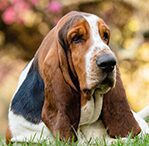
Tan, Black, & White
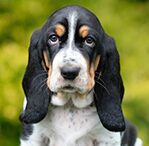
Black & White
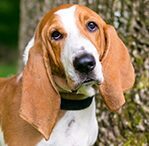
Brown & White
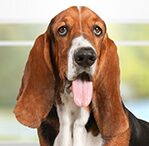
Red & White
 My Breed Characteristics
My Breed Characteristics
 Furbulous Fact
Furbulous Fact
Most people know our long ears and droopy skin are distinctive, but did you know humans gave us those features on pawpose to make us better hunters? When we start chasing a rabbit or deer, our long ears drag along the ground, picking up scents left behind by other critters. And while this is happening, our skin folds trap odors floating around in the air, which means we never veer off track. Since we have the best nose of all pups – well, besides the Bloodhound – it looks like the humans’ strategy paid off!
 As I Grow Up
As I Grow Up
As you can see, we Basset Hounds age pretty gracefully. Here are a few key milestones in my growth and development to be aware of as I grow up from a pupper to an adult and senior!
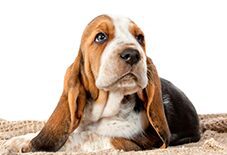
Puppy3-12 Weeks
I can be a little stubborn as a puppy, so pawlease enroll me in training classes early. Luckily, there’s an easy way to motivate me - I love treats!
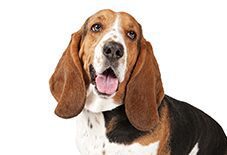
Adult1-1.5 Years
Sometimes my big, floppy ears get infected. If I start scratching them or shaking my head a lot, it's time for a trip to the vet.

Senior8-12 years
Be sure to watch my diet because I gain weight easily. When I'm getting old and less active, my favorite treats can really start to add up.
 History of My Breed
History of My Breed
We Basset Hounds trace our origins all the way back to 16th-century France, when we descended from the St. Hubert Hound, a pup that got its name from the Abbey of St. Hubert. Humans wanted the pawfect hunting companion when they went out on foot, so they created us! They gave us short legs (to slow us down) and a powerful sense of smell. Our name comes from the French adjective “bas,” which means “low” – very fitting, considering our size!
The first official record of the Basset Hound dates back to a hunting book written by Jacques du Fouilloux in 1585. Many years later, in 1886, Lord Galway brought us over the English Channel for the first time. It wasn’t until 1874 – when Sir Everett Millais started to breed us in England – that we became a truly pupular breed.
It’s also rumored that George Washington had a Basset Hound of his own. Even so, most Americans weren’t too familiar with the Basset Hound until 1928, when Time magazine published a story about us. (Interestingly, the human who wrote the story did it from the perspective of a Basset Hound. I don’t know why they didn’t ask one of us to write it!)
These days, Basset Hounds aren’t used so much for hunting, but basseting (an event where we track scents) still occurs in Virginia, Maryland, New Jersey, and Pennsylvania. Along with Beagles and Dachshunds, we’re among the most popular scent hounds in the United States.
A Basset Hound named Bouncer was the first of our breed to be registered with the American Kennel Club (AKC), all the way back in 1885. About 30 years later, in 1916, the AKC recognized us as an official member, and the Basset Hound Club of America was formed a few decades after that!
 Pawesome Pups to Parent
Pawesome Pups to Parent
In addition to purebred Basset Hounds like me, there are tons of pawfectly sweet mixed-breed Basset Hounds that are looking to find their furever homes. You can learn where to find your next pet below!
Maintain your Basset’s ears and skin.
Basset Hounds are prone to skin and ear infections due to their build. Keep their skin and ears clean, and check under their ears regularly to catch infections fast!
Be careful of your dog’s back.
Basset Hounds have long backs, which makes them predisposed to back injuries. Always be careful with lifting and jumping when it comes to your Basset Hound.
Be aware that Basset Hounds are prone to bloat.
Although GDV (bloat) typically affects large dogs, Bassets have deep chests which makes them prone to gastric torsion. Consider gastropexy at the time of spay or neuter.
 Training Tips
from Richard Lovejoy, Professional Remote Dog Trainer
Training Tips
from Richard Lovejoy, Professional Remote Dog Trainer

Train your pup to respond to commands – the first time.
As you teach your pup verbal commands like “come,” “sit,” “stay,” and the like – only give the verbal command once. If you give a command twice, you may accidentally be teaching your pup to ignore you the first time. When a pup who knows how to sit doesn’t sit when you tell them to – they’re testing a boundary. Use your body language to emphasize a point. For example, try raising your hand in a closed fist as you give your command – firmly and gently.
If your Basset Hound is a barker, ignore them.
Don’t respond to your Basset Hound when they’re barking, no matter how hard it may be. When your dog starts barking, you need to be emotionally blank about it. Go to a zen place, ignore the bark, and calmly leave the room. Let your dog know that they get nothing when they bark, and will only get what they want when they’re quiet and calm.
Coach your pup out of its stubbornness.
These scent hounds were bred to be independent hunters, so their stubbornness can sometimes be a challenge when training them. If your pup is being obstinate and repeating unwanted behaviors, turn around, ignore them for a few seconds, and take a deep breath. The trick is not letting them seize control of the narrative by doing something else to get your attention, whether it's barking or gnawing on the couch. Remember to reward the good behaviors with treats and love, ignore the bad behaviors, and always stay positive to bring out the best in your pup.

 Why Get Dog Insurance?
from Pumpkin®
Why Get Dog Insurance?
from Pumpkin®
While Basset Hounds are a generally healthy breed, unexpected ruh-rohs can happen to any dog at any age. If your pup gets hurt or sick, pet insurance can help you say ‘yes’ to the best care, even when it’s costly. When it comes to shopping for this breed, you’ll want to choose insurance plans like Pumpkin's, which can help cover the costs associated with the hereditary conditions Basset Hounds are prone to developing. While a reputable breeder will conduct genetic testing on your pup’s parents to help minimize the chances of passing down hereditary conditions, they can’t always be avoided. Let’s look at some common ones, and how Pumpkin Dog Insurance plans could help cover the cost of care!
 Thrombopathia
Thrombopathia
Thrombopathia is an autosomal recessive inherited disorder that prevents platelets in a dog’s blood from functioning properly, causing excessive bleeding. There is no cure and dogs with thrombopathia should be carefully watched. Do your best to prevent your dog from injuries and bleeding.
 Ear Infections
Ear Infections
Basset Hound’s floppy ears make them prone to ear infections caused by allergens, bacteria, and parasites. Infections are itchy, irritating, and sometimes painful. Treatments include regularly cleaning the ears, removing the infection by a vet, or medication, like antibiotics and ear drops.
- Cost to Treat
- $200-$2,500 (surgical)
- Pumpkin Pays Back*
- $180-$2,250
 Patellar Luxation
Patellar Luxation
Basset Hound’s short legs make them predisposed to this orthopedic condition where the kneecap (patella) is dislocated from its natural position in the groove of the femur (thigh bone). This condition can greatly affect mobility, and while some cases are mild, severe ones require surgery.
- Cost to Treat
- $1,500-$3,500
- Pumpkin Pays Back*
- $1,350-$3,150
 Hypothyroidism
Hypothyroidism
Basset Hounds are prone to developing Hypothyroidism, which occurs when a dog’s thyroid gland is underactive, slowing down their metabolism, and negatively affecting major organ functions. While not curable, it can be treated and managed with thyroid replacement hormone therapy.
- Cost to Treat
- $300-$5,000
- Pumpkin Pays Back*
- $270-$4,500
*Example illustrates reimbursement of a covered vet bill at a 90% reimbursement rate, where the annual deductible had already been satisfied and the annual limit had not yet been met. Coverage and reimbursement results vary based on policy options.
